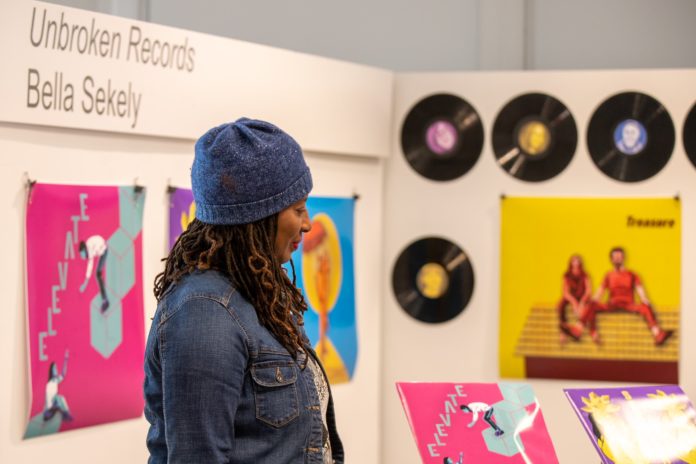The third Bachelor of Fine Arts (BFA) exhibition will be held starting on May 2 in the Martha Gault Art Gallery. Clarissa “Kaz” Spahr’s “How Are You Doing?” is one of four pieces in the exhibition.
Her exhibit is made up of six types of media. Each material connects to an emotion or emotional response. Spahr is an autistic woman who wanted to express emotions through art that she struggles to express in words.
For instance, neutrality is represented by a bare-bones print, dread is a painting done in dark colors, and grief is a metal necklace.
“[Grief is] cold, it’s heavy, and I made it out of copper, so it creates that greenish-blue [stain on the skin],” Spahr said.
From the beginning, Spahr wanted to incorporate her voice into her art. She said she needed to use multiple media due to her concentration, K-12 education, and the two ideas “snowballed” into the final exhibit.
“It started out with sitting down and feeling my emotions and how [they] impact the body,” Spahr said. “I went through each motion and then just listened to my body.
“I wrote down that information and then went through each of the [media] I’ve learned throughout the years at Slippery Rock and paired up the medium that would work best with each emotion.”
In a way, the high and low points of Spahr’s creative process were opposites. The negative emotions were easiest for her to visualize and pair with materials, with positive emotions the most difficult to pair.
Now that the exhibit is done, Spahr expressed feeling nervous, excited and overwhelmed about viewers’ reactions.
“I know I’ll be socially burnt out by the end of this, but it will be worth it because it is five years leading up to this moment,” Spahr said.
She described her want to express herself throughout college, rather than giving into fear that people will tell her that she isn’t “autistic enough.”
Emotions can be challenging for Spahr to share and express, and her exhibit includes discussion about how we don’t truly share our feelings during conversations. This makes it difficult for Spahr and other people with autism to learn about them.
“I’m just one experience and one story, and there’s other ways people can feel their emotions, autistic or not,” Spahr said.








